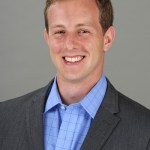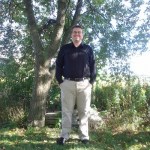Non-Academic
I've decided to do a new round of profiles in the Project for Non-Academic Science (acronym deliberately chosen to coincide with a journal), as a way of getting a little more information out there to students studying in STEM fields who will likely end up with jobs off the "standard" academic science track.
The fourteenth profile of this round (after a short hiatus for relentless book promotion) features the founder of a new crowd-funding platform for physics.
1) What is your non-academic job? I am the Founder and President of Fiat Physica, the world’s premiere physics fundraising platform.…
I've been intermittently profiling people with STEM degrees and non-academic jobs since 2009, as it turns out. One of the questions in the profile asks "What’s the most important thing you learned from science?" These have been some of the most interesting responses, so I thought it might be interesting, while I sit here and wait out a two-hour delay in the opening of the kids' schools, to compile those answers through the years.
These are in roughly chronological order, and I've left the names off because... Well, mostly because I'm being lazy, but I can invent a principled reason about how…
I've decided to do a new round of profiles in the Project for Non-Academic Science (acronym deliberately chosen to coincide with a journal), as a way of getting a little more information out there to students studying in STEM fields who will likely end up with jobs off the "standard" academic science track.
The thirteenth profile of this round (after a short hiatus for relentless book promotion) features Twitter's own Dr. Mathochist, a mathematician turned software engineer.
1) What is your non-academic job? I'm a software architect at a small company working on a mixture of contracted and…
I've decided to do a new round of profiles in the Project for Non-Academic Science (acronym deliberately chosen to coincide with a journal), as a way of getting a little more information out there to students studying in STEM fields who will likely end up with jobs off the "standard" academic science track.
The twelfth profile of this round (after a short hiatus for relentless book promotion) features a distinguished Union Physics alumnus, now a business analyst in New Jersey.
1) What is your non-academic job? I work at the Princeton, NJ office of ZS Associates, a company that describes…
I've decided to do a new round of profiles in the Project for Non-Academic Science (acronym deliberately chosen to coincide with a journal), as a way of getting a little more information out there to students studying in STEM fields who will likely end up with jobs off the "standard" academic science track.
The eleventh profile of this round features Benoit Hamelin, a biomedical engineer turned network defense programmer.
1) What is your non-academic job? I am Chief Scientist for Arc4dia, a small company in the computer security and private network defense business. I develop software, lead…
I've decided to do a new round of profiles in the Project for Non-Academic Science (acronym deliberately chosen to coincide with a journal), as a way of getting a little more information out there to students studying in STEM fields who will likely end up with jobs off the "standard" academic science track.
The tenth profile of this round features the editor of PhysicsWorld.com, which is probably the best physics magazine web site out there.
1) What is your non-academic job? I am editor of physicsworld.com, which is a website aimed at working physicists and people with a background in physics…
I've decided to do a new round of profiles in the Project for Non-Academic Science (acronym deliberately chosen to coincide with a journal), as a way of getting a little more information out there to students studying in STEM fields who will likely end up with jobs off the "standard" academic science track.
Ninth in this round is a physics major turned semiconductor engineer.
1) What is your non-academic job? I am a Plasma Etch Process Engineer at Avago Technologies, which is a semiconductor/MEMS company that produces Wireless semiconductor devices.
2) What is your science background? I…
I've decided to do a new round of profiles in the Project for Non-Academic Science (acronym deliberately chosen to coincide with a journal), as a way of getting a little more information out there to students studying in STEM fields who will likely end up with jobs off the "standard" academic science track.
Eighth in this round is Grant Goodyear, who started life as a theoretical chemist, and now does nuclear physics in the oil industry.
1) What is your non-academic job? These days I'm a nuclear physicist who works on the design and characterization of nuclear well-logging tools that are used…
I've decided to do a new round of profiles in the Project for Non-Academic Science (acronym deliberately chosen to coincide with a journal), as a way of getting a little more information out there to students studying in STEM fields who will likely end up with jobs off the "standard" academic science track.
Seventh in this round is a physics major who went into teaching high school, then decided to try medical school, and now works with the youngest possible subjects. He also had the excellent taste to send along a picture of himself with his dog...
1) What is your non-academic job? I am the…
I've decided to do a new round of profiles in the Project for Non-Academic Science (acronym deliberately chosen to coincide with a journal), as a way of getting a little more information out there to students studying in STEM fields who will likely end up with jobs off the "standard" academic science track.
Sixth in this round is an "adult-onset engineer" working at NASA on some cool stuff.
1) What is your non-academic job? I am a thermal engineer at NASA's Jet Propulsion Lab, working in the Cryogenic Systems Engineering group. Our group provides thermal engineering support (both cryogenic…
I've decided to do a new round of profiles in the Project for Non-Academic Science (acronym deliberately chosen to coincide with a journal), as a way of getting a little more information out there to students studying in STEM fields who will likely end up with jobs off the "standard" academic science track.
Fifth in this round is a bio major who now works on sustainably managing Atlantic coastal fisheries.
1) What is your non-academic job? Fishery Management Plan Coordinator at the Atlantic States Marine Fisheries Commission (management agency for fisheries)
2) What is your science background…
I've decided to do a new round of profiles in the Project for Non-Academic Science (acronym deliberately chosen to coincide with a journal), as a way of getting a little more information out there to students studying in STEM fields who will likely end up with jobs off the "standard" academic science track.
Fourth in this round is a Union alumn (another nice bonus of this is getting to promote some of my college's former students...) who prefers to remain anonymous, but is a computer engineer turned web developer for a public relations firm.
1) What is your non-academic job? I'm a web…
Someone from the American Astronomical Society ran across the Project for Non-Academic Science posts here, and is looking for someone to participate in a career panel at their upcoming meeting in Austin, TX:
The American Astronomical Society (AAS) Employment Committee is hosting a panel discussion at our annual AAS winter meeting in Austin on current issues related to the postdoc job market, with a focus on the increase in post-doc type positions without a corresponding growth in potential permanent academic positions. The session will be on Wednesday, January 11th from 10-11:30 am. They are…
(This post is part of the new round of interviews of non-academic scientists, giving the responses of S.M., a Canadian government employee who would prefer not to be identified by name. The goal is to provide some additional information for science students thinking about their fiuture careers, describing options beyond the assumed default Ph.D.--post-doc--academic-job track.)
1) What is your non-academic job?
I work for one of Canada's three federal granting agencies (one, two, three). We get money from the federal government which we give to university resesearchers (i.e. professors). We…
(This post is part of the new round of interviews of non-academic scientists, giving the responses of Carl Knutson, who works for a company making online learning systems. The goal is to provide some additional information for science students thinking about their fiuture careers, describing options beyond the assumed default Ph.D.--post-doc--academic-job track.)
1) What is your non-academic job?
am the physics content project manager for an online homework and
learning environment provider, Sapling Learning, located in Austin,
TX. We offer online homework and tutorials for undergraduate…
p>(This post is part of the new round of interviews of non-academic scientists, giving the responses of Brad Holden, of the University of California Observatories (which, OK, is affiliated with an academic institution, but this is not a traditional faculty-type job). The goal is to provide some additional information for science students thinking about their fiuture careers, describing options beyond the assumed default Ph.D.--post-doc--academic-job track.)
1) What is your non-academic job?
I am an astronomer at an observatory, specifically the University of California Observatories. Our…
(This post is part of the new round of interviews of non-academic scientists, giving the responses of George Farrants, a freelance translator (and occasional marathon runner, as seen in the picture). The goal is to provide some additional information for science students thinking about their fiuture careers, describing options beyond the assumed default Ph.D.--post-doc--academic-job track.)
1) What is your non-academic job?
I work as a freelance translator from Swedish and Norwegian into English. I try to specialise in scientific, medical and technical texts, but I accept texts from many…
(This post is part of the new round of interviews of non-academic scientists, giving the responses of Jennifer Saam, who translates between different departments at a medical diagnostic laboratory. The goal is to provide some additional information for science students thinking about their fiuture careers, describing options beyond the assumed default Ph.D.--post-doc--academic-job track.)
1) What is your non-academic job?
I am a medical science liaison at a medical diagnostic laboratory.
I work in the medical services department and this department maintains the scientific integrity for the…
(This post is part of the new round of interviews of non-academic scientists, giving the responses of Matthew Schlecht, a chemist by training who runs his own technical translation service, Word Alchemy Translation. The goal is to provide some additional information for science students thinking about their fiuture careers, describing options beyond the assumed default Ph.D.--post-doc--academic-job track.)
1) What is your non-academic job?
I am a free-lance technical translator working into English from Japanese, German, French, Spanish and occasionally Russian, in the areas of chemistry,…
(This post is part of the new round of interviews of non-academic scientists, giving the responses of Richard Lobinske, a Hazardous Waste Manager (meaning he handles chemicals, such as these decades-old pesticides, not particularly noxious low-level employees). The goal is to provide some additional information for science students thinking about their fiuture careers, describing options beyond the assumed default Ph.D.--post-doc--academic-job track.)
1) What is your non-academic job?
Hazardous Waste Manager. I oversee a county household hazardous waste collection program that also handles…






